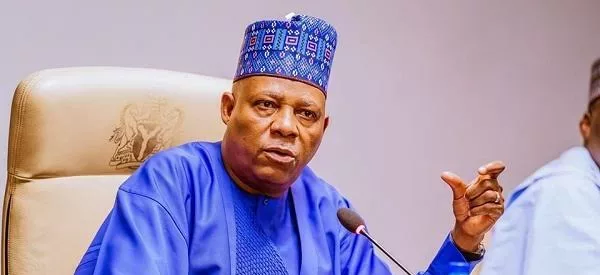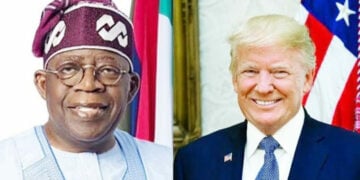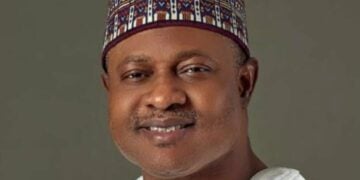Vice President Kashim Shettima has called an urgent meeting with the minister of state for petroleum, Heineken Lokpobiri, and the chief executive officer of the Nigerian National Petroleum Company (NNPC), Mele Kyari, to address the ongoing fuel scarcity across the country.
The meeting, held on behalf of President Bola Tinubu, who is currently on an official visit to China, also included the national security adviser, Nuhu Ribadu.
Following the discussions, Lokpobiri addressed reporters at the State House and assured the public that the fuel crisis would soon be resolved, saying the NNPCL has sufficient fuel supplies to meet national demand.
Lokpobiri urged Nigerians to remain calm, adding that increased availability of petroleum products would foster competition and drive down prices.
He further emphasised that the government was not responsible for recent hikes in fuel costs.
He said, “We have been with the vice president to brief him about what is going on across the country.
“What is important is for us to convey to Nigerians that the President is empathetic about what is happening in the country. He is concerned about the hardship of Nigerians, which is why he directed the Vice President to call this meeting, for us to reflect on the situation.
“What is important is that products are available in the country, and we believe that between now and the weekend, there will be availability of products across the length and breadth of the country.
“The price could be high in some areas, much higher in others, and in some locations, much higher than in other areas, but we believe that once there is availability of products across the country, the price itself will stabilise.
He stressed that government is not the one fixing petroleum prices.
“This sector is deregulated. We believe that with the availability of products, the price will find its level. This is important for Nigerians to know.
“The summary is that the President is empathetic about what’s going on. That’s why he directed this meeting. There is enough product in the country to meet the demands of Nigerians; there should be no panic buying.
“And we also believe that Nigerians need to know that the government is not fixing prices. That is what I want to convey to Nigerians.”
For his part, Mugo Kalu Okuoha, the executive director at the Nigeria Mainstream Downstream Petroleum Regulatory Authority, said all regulatory efforts are now geared towards stabilising supply, which has a positive impact on price stability.
He said, “To that objective, the regulator has ensured increased operating hours from all loading depots, vessels are being cleared promptly, and extended hours where safety permits for truck-outs as well.
“More importantly, there is also a reinforcement of the support being given to local refiners because with increased production from them, as the minister has said, there will be higher supply, which will stabilise the price. That’s the effort the regulator is making.”
Lawmakers Condemn Price Hike, Demand Immediate Reversal
The Minority Caucus in the House of Representatives has condemned the recent announcement by the Nigerian National Petroleum Company Ltd (NNPCL) increasing the price of petrol.
The opposition lawmakers said the development was ill-timed and grossly insensitive to the harsh economic conditions being experienced by Nigerians across the country.
The caucus, in a statement signed by its chairman and House Minority Leader, Hon. Kingsley Chinda (PDP, Rivers), called for the immediate reversal of the new fuel price regime.
Chinda said that at a time when the nation was grappling with unprecedented economic challenges, including rising inflation, unemployment, and the depreciating value of the naira, any further increase in the price of petrol would only exacerbate the suffering of the average Nigerian.
“The ripple effects of such an increase are far-reaching, impacting the cost of transportation, food, and other essential goods and services. This will ultimately erode the already fragile purchasing power of millions of our citizens, pushing more families into poverty.
“The Minority Caucus is deeply concerned that this decision by the NNPC appears to have been made without adequate consultation with relevant stakeholders, including the National Assembly, which represents the interests of the people. This unilateral action disregards the principles of transparency, accountability, and fairness, which should guide decisions affecting the lives of the citizenry.
“The current dire economic conditions, characterised by rising unemployment, soaring inflation, and widening inequality, have placed immense pressure on the livelihoods of citizens. These hardships have understandably triggered widespread protests as people demand relief and accountability from those in power.
“The resulting unrest and chaos serve as stark reminders that economic instability can quickly escalate into broader social and political instability,” he said.
The statement emphasised the need for all sectors, including government, businesses, and civil society, to tackle economic challenges and prevent further instability, adding that President Tinubu’s government must urgently address the link between worsening economic conditions and social unrest.
It said failing to do so risks fueling more protests and violence from unemployed youths, reminding the government of the destructive impact of past national protests driven by severe economic issues.
The opposition lawmakers called on the federal government to urgently intervene and reverse this unwarranted increase in petrol prices, urging the government to explore and implement more sustainable measures to stabilise the economy without burdening the people.
“This includes prioritising the rehabilitation and upgrading of our local refineries, curbing corruption within the petroleum sector, and ensuring that subsidies genuinely benefit the masses rather than a few privileged individuals.
“The Minority Caucus stands with the Nigerian people in rejecting this petrol price hike and will continue to advocate for policies prioritising the welfare and well-being of all citizens. We urge the government to listen to the people’s voice and take immediate steps to alleviate their suffering rather than aggravate it,” the statement added.
Commuters Stranded As Transport Fares Soar
Commuters in the Federal Capital Territory (FCT) are grappling with soaring transportation costs as fuel prices continue to rise following the removal of subsidies.
The impact has been severe, with fares for buses, taxis, and commercial motorcycles nearly doubling across Abuja.
In places like Nyanya, Gwagwalada, and Lugbe, residents have seen sharp increases in transportation costs. A bus ride from Nyanya to the Central Business District, which used to cost N300, now ranges between N600 and N700, leaving many government workers, students, and other residents struggling to manage daily commuting expenses.
Amina Usman, a civil servant residing in Gwagwalada, shared her frustration: “The cost of transportation has become a burden. I used to spend N500 on daily transport, but now it’s almost N1,000. Meanwhile, my salary hasn’t changed, affecting everything.”
The situation is equally challenging for commercial transport operators. Abdullahi Musa, a bus driver in Wuse, explained that the rising fuel cost has forced them to increase fares.
“We don’t want to charge people this much, but we have no option with the fuel price now at over N600 per litre. If we don’t adjust, we’ll be running at a loss,” Musa said.
The FCT’s popular tricycle services (Keke NAPEP) have also seen a rise in fares, with short-distance trips that once cost N200 now going for N400 or more. For residents living on the city’s outskirts, commuting into the city centre has become more expensive than ever, further stretching their already tight budgets.
The situation is no different in Lugbe, where many low- to middle-income earners reside.
Okon Effiong, a university student, mentioned that he has started walking longer distances or carpooling with friends to save on transport fares.
“I can’t afford to take a bus every day anymore, so I walk part of the way to my destination or share rides with my classmates. It’s tough, but we have to manage,” Effiong said.
Maryam Garba, a shop owner in Lugbe, also lamented the hardship caused by the increasing transportation costs.
“I rely on daily sales to survive, but people spend less because they have to use most of their money for transport. It’s affecting everyone, and the government needs to find a solution quickly,” she said.





